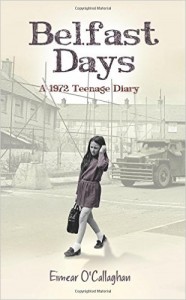Painful to remember, too important to forget
 It would be difficult to overestimate the impact of Northern Ireland’s violent past. Victims are haunted by it. Politicians stalked by it. Peace initiatives stymied by it. Some observers argue that we should draw a line under it and move on.
It would be difficult to overestimate the impact of Northern Ireland’s violent past. Victims are haunted by it. Politicians stalked by it. Peace initiatives stymied by it. Some observers argue that we should draw a line under it and move on.
Given its sensitivity, I agonised over the ‘right’ thing to do when I unexpectedly came across a diary that I penned as a Belfast schoolgirl more than forty years ago during the bloodiest twelve months in ‘the Troubles’.
I unearthed it while clearing out a spare-room wardrobe one sunny afternoon in 2010. I held a bulging, cream briefcase above my head and watched decades of memories cascading onto my bed: letters, photos, birthday cards, school reports, my children’s earliest drawings. Among them was my diary from 1972 — when I was sixteen and violence claimed nearly five hundred lives.
Skimming through pages unopened since then, I realised I possessed a unique, first-hand account of life as a terrified, Catholic teenager in a city convulsed by terror.
Would it be right to resurrect the savagery of that dark era — or should I consign it to history as many would prefer?
Tentatively, I submitted an article to The Irish Times, recounting my shock at what I’d recorded about ‘Bloody Sunday, as a naive, un-politicised schoolgirl. It was my first venture into freelance feature writing after 30-years as a BBC journalist.
The response to the published article delighted me. Suggestions that I write a book confounded me.
In 1975, Nobel laureate, Seamus Heaney, wrote the poem ‘Whatever You Say, Say Nothing’, reflecting a fear of ‘exposure’ common throughout Northern Ireland: “…The famous / Northern reticence, the tight gag of place / And times…And whatever you say, you say nothing”.
My initial inclination was to do precisely that.
Why raise my ahead above the parapet in a deeply divided society, still raw from conflict?
Why risk offending or antagonising someone by sharing observations, fears and prejudices never meant for eyes other than my own?
How could I justify exposing the life my parents built around my four brothers and me to wider scrutiny?
Anyway, who’d be interested in an ordinary teenager who hadn’t taken part in the conflict or had anyone belonging to her killed?
 A niggling voice reminded me, however, how much I always dreamed of writing a book. Inspired, too, by the memory of my father who took the same dream to his grave, I agreed to consider it, if only for my children’s sake.
A niggling voice reminded me, however, how much I always dreamed of writing a book. Inspired, too, by the memory of my father who took the same dream to his grave, I agreed to consider it, if only for my children’s sake.
Still unsure, I set about the laborious, often harrowing process of wading through my diary. Night after night, it transported me back to a person, place and time I no longer recognised. Forty years had blurred my recollection.
My teenage scrawl forced me to recall bombings, shootings, riots, and hourly news bulletins with their litany of death. It reminded me of my terror as gunfire pierced the night air and British army helicopter searchlights cast shadows across my bedroom walls: ‘June 9…Shooting started. Lay in terror in bed for 2 hours listening. All I could do was pray…’
I had forgotten the ordeal of shopping in Belfast city centre: ‘Dec 2… a bomb went off in Anne Street. 22 injured. Followed immediately by a series of bomb-scares. All big shops closed —thousands of people on the streets. Panic…’
And without the evidence of my diary in front of me, I couldn’t have believed that one night, ‘…I came to bed convinced that prayer is our only hope…we haven’t got a gun…’
Sometimes overwhelmed to the point of tears, I clung to delightful episodes of ‘normality’ dotted through the diary. I was embarrassed by reminders of my gauche, petulant, teenage self. I marvelled at how ordinary families functioned against a background of near civil war.
In his work, The Life of Reason, the Spanish-born philosopher George Santayana maintained that: “Those who cannot remember the past are condemned to repeat it.” Reflecting on my experiences, as the mother of three grown-up children, I knew I had no option but to write Belfast Days.
Examining my own story gave me a new perspective on one of the darkest periods in recent Anglo-Irish history. While painful to remember, it is too important to forget.
Belfast Days is for the generations growing up who have no experience of violence. It is for people who’ve forgotten, or chose not to remember, the depths to which we plummeted.
It demonstrates how speedily and easily a society can violently implode, and should serve as a warning against being complacent about peace. It is a testament to the resilience of tens of thousands of ordinary people trapped in a conflict not of their making.
I could have restricted the book to a simple reproduction of my diary but that would have done scant justice to the journey that Northern Ireland’s people have travelled. Ultimately, it is a celebration of redemption, progress and hope. As I reflect in the epilogue, Belfast today is unrecognisable from the city I grew up in.
The reaction to Belfast Days has vindicated my decision to write it. People across the religious divide have thanked me for acknowledging our shared pain. Outsiders have commended the book for improving their understanding of what happened and why. Hopefully, it will serve as a reminder that while we should not forget our history, we should not be shackled by it.
Writing about the past cannot change what happened but it can help to shape a better future.
—
Eimear O’Callaghan began writing after more than 30 years in broadcast journalism. Her first book, Belfast Days, was published in October 2014. She’s currently suffering from ‘second-book syndrome’ but fills her creative time writing freelance features, mostly as a correspondent for Celtic Life International magazine. She lives in the seaside town of Portstewart on Northern Ireland’s Atlantic coast.
Follow Eimear on Twitter @e_ocallaghan
Belfast Days is available here http://irishacademicpress.ie/product/belfast-days-a-1972-teenage-diary and on Amazon
Category: Contemporary Women Writers, On Writing

























Thankyou so much. I’m sitting here amidst of a pile of about 55 full journals. I’m so overwhelmed by this pile but I honestly feel there are some hidden ‘gems’ in them. I am writing my Memoir now and I’m hoping to excavate some wisdom from them. Thank you.